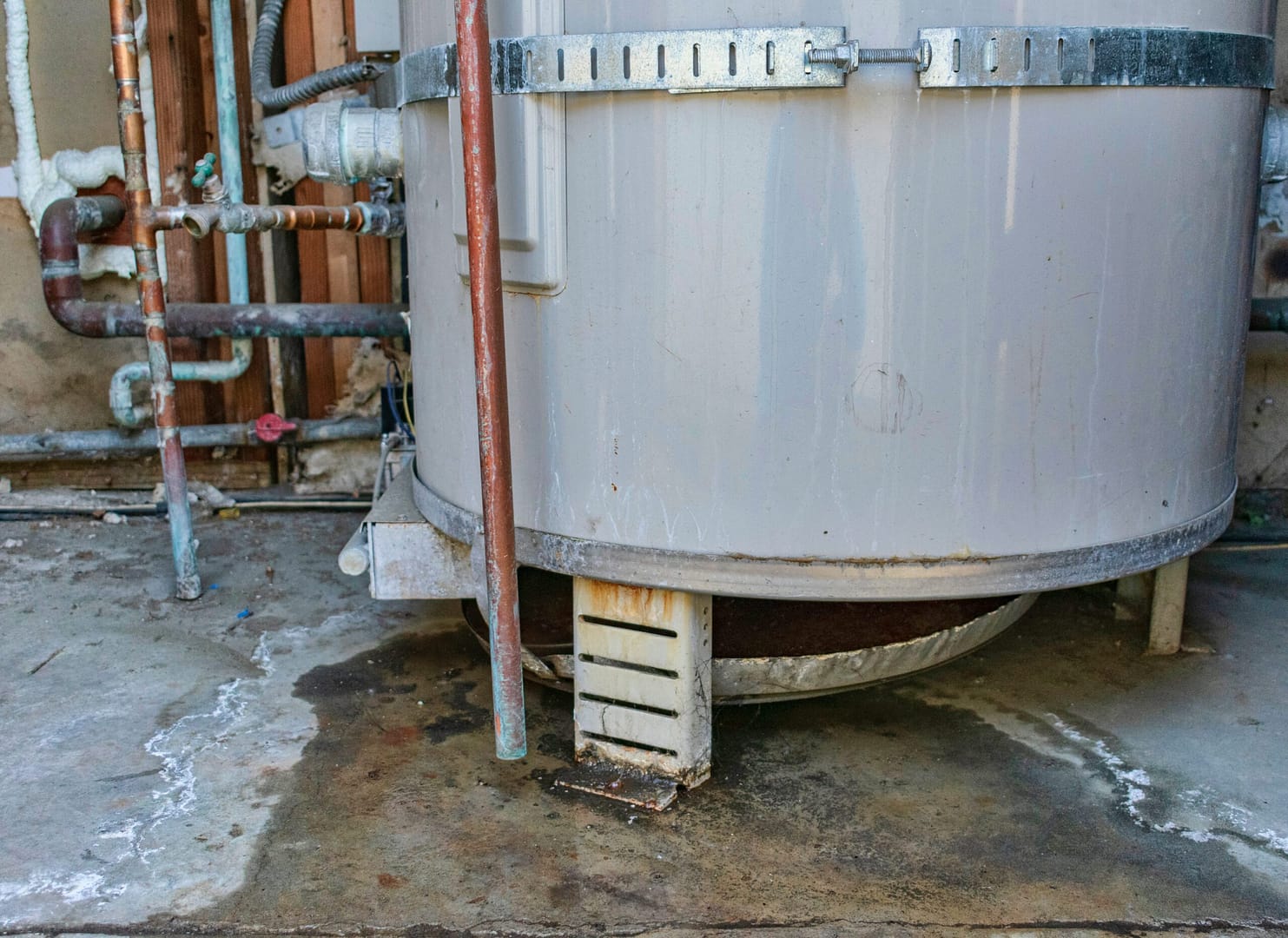Hot water is one of those little luxuries that we’ve all come to take for granted. From washing dishes to washing ourselves, a working, efficient hot water system is a must for our everyday lives. Unfortunately, nothing lasts forever, so it’s important to recognize the signs you need a new hot water heater.
1. Age Of Your Heater
The average lifespan of a water heater is usually somewhere between 8-12 years. At this point, it’s probably more economical (if not absolutely necessary) to replace your system rather than repair it.
As water heaters age, the risk of various forms of failure increase. Corrosion, leaks or even an outright burst are all more likely to come from an older tank.
Beyond the risk of a catastrophic failure, an older tank will heat water less efficiently than a newer one, costing you more on your utilities bill too.
How to tell the age of your water heater
If you bought your home new, or you’ve replaced the system since you moved in, it’s relatively straightforward to find out the age of your water heater. If you’ve moved in to an older house, it’s probably a good idea to consult a licensed plumber to ascertain the age of your system.
2. Rusty Water
Water and metal, will eventually lead to two things – rusty metal and rusty water. Eventually, rust and corrosion will lead to leaks and leaks will lead to expensive repair bills.
If you’ve got rusty stains in your sink or bath that could be a sign that corrosion is taking over your system. In extreme cases the water itself can take on a visible orangey tint if you have a rusty water heater.
Another sign to keep an eye out for is a metallic taste to your water. This is a sign that something isn’t right and needs investigation.
What Else Could It Be?
Hopefully, this just means that the anode rod (which is there to attract corrosion away from your tank) has reached the end of its life. This is a fairly easy replacement.
3. Unusual Noises
If your water heater is making rumbling, crackling or popping noises that is definitely a sign that age is starting to take its toll.
Not only are these noises annoying they are a common symptom of sediment build up within your system and can be a warning sign of some serious water heater problems coming down the line.
Over time, impurities in the water, bacterial growth and corrosion in your tank can produce a sedimentary sludge. This sediment will affect the efficiency of your water heater (costing you more to heat your water) and eventually can lead to corrosion problems getting worse and worse.
What Can I Do About Unusual Noises
An annual flush of your system can help keep sedimentary deposits down. As your hot water heater ages, the amount of sludge and the regularity with which you’ll need to flush will increase. The buildup of sludge and unusual noises could be signs that you need a new hot water heater.
4. Frequent Repairs
Sometimes you just need to know when to cut your losses and replace the whole thing.
While this is always going to be a value judgement, weighing up the costs, if you find your water heater is needing repaired more and more frequently, it might be time to replace it with a new model.
While it may be cheaper to repair the occasional issue, eventually the costs and the inconvenience of constant patching will outweigh the cost of replacement.
What Can I Do To Avoid Needing Repairs?
Regular maintenance and flushing will extend the time between repairs. Keeping on top of these will extend the life of your water heater, but ultimately, nothing lasts forever.
5. Inconsistent Water Temperature
There is nothing worse than turning on the tap and being faced with either freezing or scalding water when you expected a nice warm stream.
If you’re finding unexpected fluctuations in your water’s temperature (or water that’s consistently too hot or too cold), you’re likely facing a problem with either your heating element or thermostat.
While it might be possible to fix the issue without resorting to a full replacement, sometimes these issues are symptomatic of a deeper issue and could be signs that you need a new hot water heater.
What has caused my element/thermostat to fail?
There are a few issues which could cause this particular set of water heater problems.
- Faulty wiring
- Corroded element
- Broken thermostat
If your water heater is constantly tripping your breaker, it’s vital to have it properly investigated. Water and electricity don’t mix.
6. Leaks around the Water Heater
If you’re finding pools of water around your water heater that can lead to all kinds of problems including;
- Increased Water Bills
- Increased Electricity Bills
- Dampness
- Mold
- Structural Damage
Over time, a minor dribble can become an almighty flow. It’s always cheaper to deal with the issue then and there and avoid a much bigger bill down the line.
Can I Just Fix A Leak?
While you can patch a tank, there will always be a weak point and any fix will be at best temporary. If the tank of your water heater is leaking (as opposed to a pipe) you’re almost always better off simply replacing the whole unit.
7. Slow Recovery Time
You’ve washed the dishes and bathed the kids and now it’s time to unwind with a nice hot shower. Unfortunately, your water heater hasn’t managed to catch up yet and you’re left with a lukewarm stream.
The time it takes for your tank to re-heat the water to the desired level is referred to as the “recovery time” and as your tank ages, you’ll find that it takes longer and longer.
Will A New Heater Really Heat Water Faster?
Absolutely. Technology has come a long way in the last few years and many newer water heaters boast all kinds of clever ticks to help boost recovery times.
Even if you opt for a very basic new unit, the lack of corrosion and sludge in your new tank will offer vastly more efficient heating when compared to a water heater near the end of its lifecycle.
8. Cloudy Water Or Bad Odors
Clean, fresh water is an even more fundamental part of modern life than hot water. If you turn on the faucet and find a bad smell or cloudy water flowing through, it’s time to consider your options.
Our water supplies contain tiny amounts of lots of different minerals. Over time, these build up in our water heaters, sticking to the sides and elements, reducing efficiency.
Worse than this, these minerals can provide food for bacteria. When colonies of bacteria get out of hand in water (known as a bacterial bloom), you’ll often find it turns an unpleasant cloudy/milky color. It goes without saying that this will need fixing.
What Can I Do About Minerals And Bacteria In My Water Heater?
While regular flushing and cleaning will usually keep the worst mineral deposits under control and should keep bacteria to a heathy level, once the problem starts, this build of bacteria and cloudy water could be signs you need a new hot water heater.
9. Increased Energy Bills
Whether you use electricity or gas to heat your water, if you notice your bills are rising without you using more, it’s probably a sign that your water heater needs replacing.
As the elements and tank age, they become less efficient, requiring more power to heat water to the same level.
Will A New Heater Really Save Me Money?
While a new water heater might be a major one-off expense, it can often work out cheaper over the system’s lifetime to replace an aging model with a newer, more efficient one.
10. Visible Corrosion
If you’re noticing rusty water, leaks or discoloration around the pipes on your water heater, those are visible signs of corrosion, and it’s almost certainly time to call a plumber to talk about a new installation.
Keep an eye out around anywhere that there’s a joint between your tank and the inlet or outlet pipes in particular. Any orange or brown staining here is a sure sign.
Conclusion:
While no one wants to go through the inconvenience or expense, knowing the signs of when it’s time to replace your water heater can actually end up saving you both money and a lot of hassle. After all, what is life without reliable hot water?

